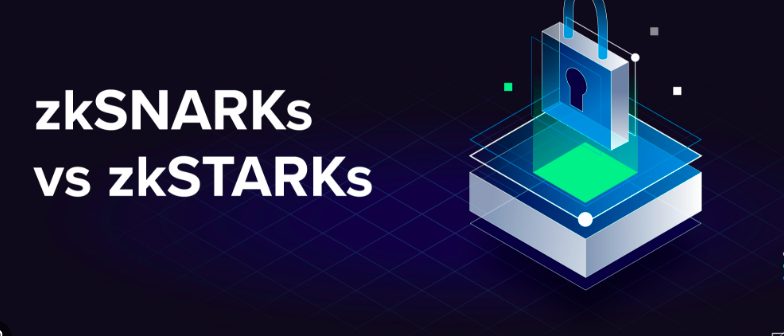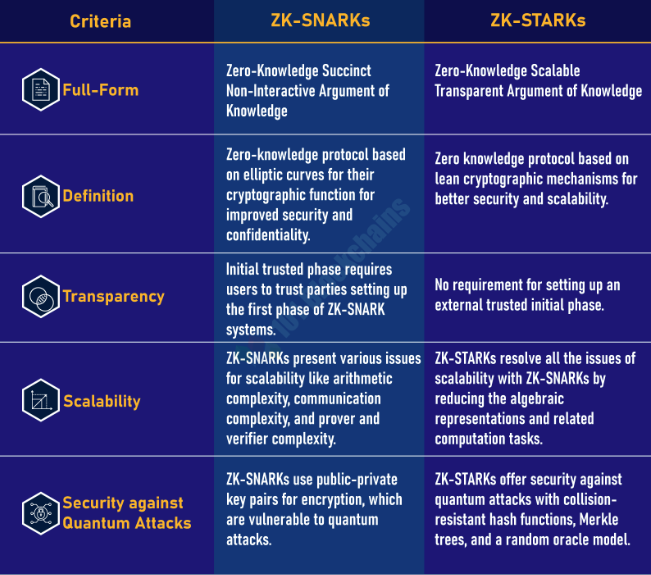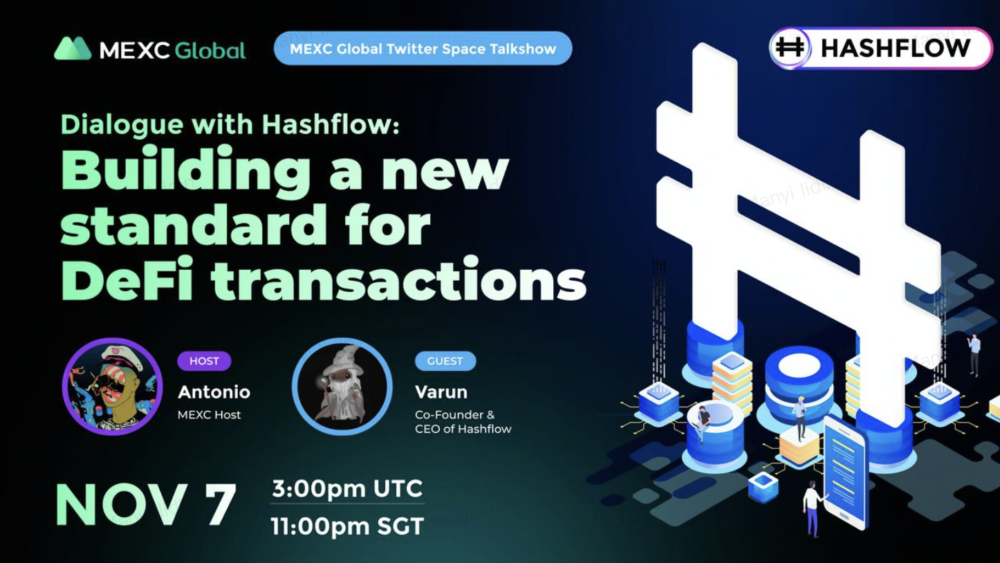In this article, we will compare and contrast zk-STARKs and zk-SNARKs, two prevalent zero-knowledge technologies in the blockchain.

To fully grasp the distinction between these two technologies, it is crucial first to understand the issues they aim to resolve. Privacy and scalability are the most significant hurdles preventing the widespread adoption of blockchain technology. While a public, permissionless blockchain sounds promising, a future where every transaction is publicly visible and trackable is a potential dystopia. Publicly accessible transaction records can serve as reliable evidence of activity, but they can also trace a user’s real-world identity and potentially harm them. Additionally, we need to improve the current state of blockchain technology to support applications that achieve mass adoption without compromising decentralization.
ZKPs; zero-knowledge proofs

ZKPs allow one party to verify the validity of a transaction without the need to disclose any additional information about it. They are a way to prove authenticity while maintaining privacy. For a ZKP to be effective, it must satisfy three criteria: completeness, soundness, and zero knowledge. ZKPs come in two forms: interactive and non-interactive.
Interactive ZKPs involve communication between the prover and the verifier until the truth of the prover’s claims is confirmed.
Non-interactive ZKPs, on the other hand, only require a single exchange of information to achieve mutual agreement. The most commonly used non-interactive ZKPs are zk-SNARKs and zk-STARKs, which will be the focus of this article. We will examine their characteristics, applications, and use cases in detail.
zk-SNARKs
“zero-knowledge succinct non-interactive arguments of knowledge” is a technology that allows for the verification of transactions and computations without revealing any underlying information. Eli Ben-Sasson, Alessandro Chiesa, Christina Garman, Matt Green, Ian Miers, and Eran Tromer first introduce this technology in 2012. It is considered a pioneering development in the field of zero-knowledge proofs.
. Zk-SNARKs are a specific type of zero-knowledge proof, considered particularly efficient and practical for use in blockchain-based systems.
One of the key advantages of zk-SNARKs is their efficiency. These zero-knowledge proofs can be verified relatively quickly and with relatively little computational power, making them well-suited for use in large-scale systems such as blockchains. This is achieved by the use of succinct proof, which is smaller in size and can be verified faster than traditional proof, which is a vital characteristic of blockchain-based systems.
zk-STARKs
“zero-knowledge scalable transparent arguments of knowledge” Was introduced in 2018 by Eli Ben-Sasson, Iddo Bentov, Yinon Horeshy, and Michael Riabzev. It is considered an advancement in the field of non-interactive zero-knowledge proofs.
Zk-STARKs are an extension of these zero-knowledge proofs, offering several key benefits.
These zero-knowledge proofs enable developers to execute computation and store data off-chain. Then Zero-knowledge proofs can then be used to verify these off-chain activities, which can be submitted online for others to verify. This allows for the efficient verification of large numbers of transactions without needing on-chain storage and computation.
Another advantage of zk-STARKs is their transparency. Unlike other zero-knowledge proof systems, zk-STARKs use publicly available randomness to generate parameters, eliminating the need for a trusted setup. This means that anyone can verify the correctness of the proof without relying on a trusted third party.
Zk-STARKs are also considered more secure than other zero-knowledge-proof systems. They use a different computational approach called “argument of knowledge,” which involves using hash functions resistant to collisions. This effectively eliminates the need for trusted setups and enhances security.
Zk-SNARK vs STARK
zk-SNARKs (zero-knowledge succinct non-interactive arguments of knowledge) and zk-STARKs (zero-knowledge scalable transparent arguments of knowledge) are both types of zero-knowledge proof systems. Both technologies allow a person to prove that they possess certain information without revealing what that information is.
However, there are several key differences between the two technologies.

There are a few differences between zk-SNARKs and zk-STARKs.
Scalability
Zk-STARKs enable developers to execute computation and store data off-chain, significantly increasing scalability. Zero-knowledge proofs then verify these off-chain activities, which it can further submit online for others to verify. This allows for the efficient verification of large numbers of transactions without needing on-chain storage and computation. In contrast, zk-SNARKs are less scalable as they require large amounts of storage and computation to process large data sets.
Trusted Setup
Zk-SNARKs rely on a trusted setup which is a process in which a group of participants generates a public parameter. It is then used in the proof process. These parameters must be kept secret, and if they are compromised, the security of the proof process is also compromised. Zk-STARKs, on the other hand, do not rely on a trusted setup, which eliminates this security risk.
Efficiency
zk-SNARKs have the advantage of succinctness, meaning the proof can be verified faster and with less computational power, whereas zk-STARKs are more computationally intensive. Zk-SNARKs are also non-interactive, meaning they don’t require interaction between the prover and verifier during the proof process. On the other hand, zk-STARKs are interactive, and this feature makes them more flexible.
Transparency
It is another major difference between the two technologies. Zk-STARKs use publicly available randomness to generate parameters, eliminating the need for a trusted setup. This means that anyone can verify the correctness of the proof without relying on a trusted third party. Zk-SNARKs, on the other hand, rely on a trusted setup, which can be seen as less transparent.
Conclusion
zk-SNARKs are efficient and non-interactive, but they rely on a trusted setup and need to be more scalable. Zk-STARKs, on the other hand, are more scalable and transparent, but they are more computationally intensive and require interaction between the prover and verifier during the proof process. Both have their advantages and disadvantages, and their suitability depends on the specific use case.
Personal Note From MEXC Team
Check out our MEXC trading page and find out what we have to offer! You can learn more about crypto industry news. There are also a ton of interesting articles to get you up to speed with the crypto world. Lastly, join our MEXC Creators project and share your opinion about everything crypto! Happy trading!
Join MEXC and Start Trading Today!



